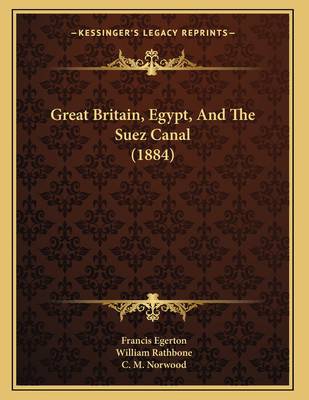
- Afhalen na 1 uur in een winkel met voorraad
- Gratis thuislevering in België vanaf € 30
- Ruim aanbod met 7 miljoen producten
- Afhalen na 1 uur in een winkel met voorraad
- Gratis thuislevering in België vanaf € 30
- Ruim aanbod met 7 miljoen producten
Zoeken
Great Britain, Egypt, And The Suez Canal (1884)
Francis Egerton, William Rathbone, C M Norwood
Paperback | Engels
€ 31,45
+ 62 punten
Uitvoering
Omschrijving
Great Britain, Egypt, and the Suez Canal is a historical book written by Francis Egerton, which was first published in 1884. The book provides a comprehensive account of the political and economic events that led to the construction of the Suez Canal, as well as its impact on the relationship between Great Britain and Egypt. Egerton's book starts with an overview of the history of Egypt, from its ancient past to the Ottoman Empire's rule. He then moves on to discuss the construction of the Suez Canal, which was started in 1859 and completed in 1869. The author provides a detailed account of the engineering challenges that were faced during the construction of the canal and the impact it had on the region's economy.Egerton also explores the political implications of the Suez Canal's construction, particularly in relation to the British Empire's interests in the region. He examines the strategic importance of the canal, which provided a vital trade route between Europe and Asia, and how it influenced British foreign policy towards Egypt.The book also discusses the various conflicts that arose as a result of the canal's construction, including the Suez Crisis of 1956, which was a major international incident that involved military intervention by Britain, France, and Israel. Egerton provides a detailed analysis of the crisis and its impact on the region's political landscape.Overall, Great Britain, Egypt, and the Suez Canal is an important historical work that provides valuable insights into the political and economic developments that shaped the modern Middle East. It is a must-read for anyone interested in the history of the region and the role played by Great Britain in shaping its destiny.This scarce antiquarian book is a facsimile reprint of the old original and may contain some imperfections such as library marks and notations. Because we believe this work is culturally important, we have made it available as part of our commitment for protecting, preserving, and promoting the world's literature in affordable, high quality, modern editions, that are true to their original work.
Specificaties
Betrokkenen
- Auteur(s):
- Uitgeverij:
Inhoud
- Aantal bladzijden:
- 36
- Taal:
- Engels
Eigenschappen
- Productcode (EAN):
- 9781165464241
- Verschijningsdatum:
- 10/09/2010
- Uitvoering:
- Paperback
- Formaat:
- Trade paperback (VS)
- Afmetingen:
- 216 mm x 279 mm
- Gewicht:
- 140 g

Alleen bij Standaard Boekhandel
+ 62 punten op je klantenkaart van Standaard Boekhandel
Beoordelingen
We publiceren alleen reviews die voldoen aan de voorwaarden voor reviews. Bekijk onze voorwaarden voor reviews.











